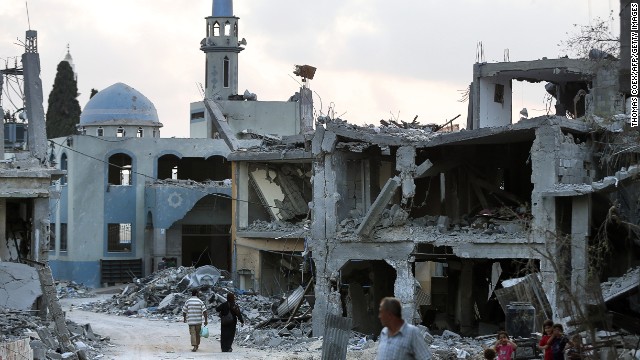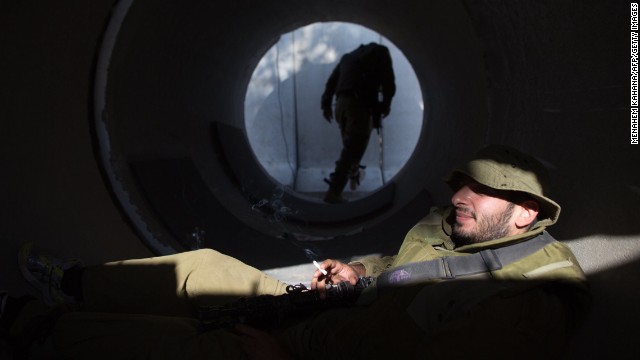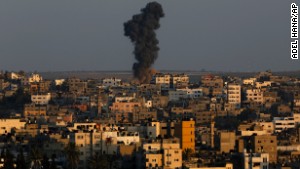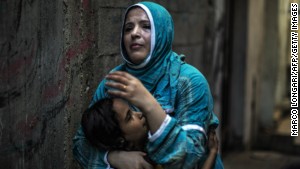Hamas kills 18 suspected Israel informants
Hamas carried out a deadly purge of suspected informants in Gaza, killing as many as 18 people suspected of providing information to the Israel Defense Forces as fighting flared anew following the collapse of Egyptian-brokered cease-fire talks.
Masked gunmen killed seven suspected informants for Israel near a Gaza City mosque as worshippers were ending midday prayers on Friday, according to a witness and Hamas media. Earlier in the day, Hamas killed 11 men by firing squad in Gaza City's police headquarters, according to the Hamas-run Al Rai website.
Two of those killed were women, according to the Palestinian Center for Human Rights, which called for an immediate halt to what it said were "extra-judicial executions."
Hamas media portrayed the killings as the beginning of a new crackdown, under the rallying cry of "choking the necks of the collaborators." The killings, which took place near the al-Omari Mosque in downtown Gaza, occurred a day after Israel killed three top Hamas military commanders in an airstrike on a house in southern Gaza.
A witness says masked gunmen lined up the seven men in a side street and opened fire on them. He spoke on condition of anonymity, fearing for his own safety.
"We will not accept anything less than an end to the [Israeli] aggression and an end to the blockade."
- Senior Hamas political leader Ismail Haniyeh
The deaths marked the third time since the outbreak of the Gaza war six weeks ago that Hamas has announced the killing of alleged collaborators. On Thursday, it said seven people had been arrested and that three of them had been killed on suspicion of working with Israel.
In pinpointing the whereabouts of the Hamas commanders, Israel likely relied to some extent on local informers. Israel has maintained a network of informers despite its withdrawal from Gaza in 2005, at times using blackmail or the lure of exit permits to win cooperation.
Meanwhile, Israel-Gaza fighting continued for a third day since the collapse of Egyptian-led cease-fire talks earlier this week.
An Israeli airstrike on a Gaza farm killed two Palestinians on Friday, a Gaza health official said. By midmorning, Israel had launched about 20 airstrikes at Gaza, while Gaza militants fired at least 26 rockets at Israel, the Israeli military said.
The renewed exchanges have dashed hopes for a lasting truce after a monthlong war that has already killed over 2,000 Palestinians. And earlier this week, Hamas rejected an Egyptian truce proposal under which Israel would gradually ease its blockade of Gaza, without giving specific commitments.
Hamas demands a lifting of the border closure imposed by Israel and Egypt after the militant group's takeover of the coastal strip in 2007.
A quick resumption of indirect talks between Israel and Hamas in Cairo also seems unlikely, particularly after the killing of the three Hamas commanders. Senior Hamas political leader Ismail Haniyeh said late Thursday that his group would not budge from its demands.
"We will not accept anything less than an end to the (Israeli) aggression and an end to the blockade," Haniyeh said in a statement posted by Al Rai. "Anyone involved in cease-fire efforts must understand that our people will not accept anything less than this."
Despite the crisis, Palestinian President Mahmoud Abbas was in Qatar meeting Hamas political chief Khaled Mashaal to push him to return to a cease-fire, and to encourage Qatar to support Egyptian cease-fire efforts, a Palestinian official said.
Abbas was set to travel to Egypt later Friday to meet with Egyptian intelligence officials to discuss cease-fire efforts, the official added, speaking on condition of anonymity to discuss issues related to the negotiations.
Since Israel-Hamas fighting erupted on July 8, at least 2,086 Palestinians have been killed in the coastal territory, according to Gaza health official Ashraf al-Kidra.
Nearly a quarter of the dead -- 469 -- are children, according to the top UNICEF field officer in Gaza, Pernilla Ironside. Of the more than 10,400 Palestinians wounded, nearly a third are children, according to UNICEF figures, while some 100,000 Gazans have been left homeless.
On the Israeli side, 67 people have been killed in the past six weeks, including 64 soldiers, two civilians and a Thai worker.
The airstrike Friday that hit the livestock farm where two workers were killed, also wounded three Palestinians, al-Kidra said. The Israeli military said its strikes targeted concealed rocket launchers and weapons sites.
In Israel, one civilian was moderately wounded by a rocket that hit the major southern city of Beersheva on Friday and another Israeli was lightly hurt by a rocket that landed in the border town of Sderot.
Israel has said that the three Hamas commanders killed Thursday had played a key role in expanding the militants' military capabilities in recent years, including digging attack tunnels leading to Israel, training fighters and smuggling weapons to Gaza. One of the trio also played a role in the capture of Israeli soldier Gilad Schalit in 2006. After being held captive in Gaza for more than five years, Schalit was exchanged for more than 1,000 Palestinian prisoners in 2011.
Israel says the Gaza blockade is needed to prevent Hamas and other militant groups from getting weapons. The restrictions prevent most Gazans from traveling outside the crowded coastal strip and bar most exports.
The Associated Press contributed to this report.





